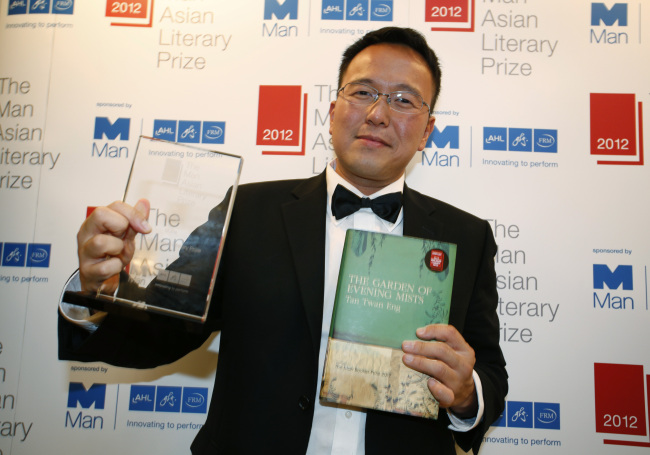HONG KONG (AFP) ― Author Tan Twan Eng became the first Malaysian author to win Asia’s top literary prize on Thursday for his novel set during the aftermath of the Japanese occupation of Malaya.
Tan won the $30,000 Man Asian Literary Prize with “The Garden of Evening Mists,” beating four other shortlisted books.
Literary critic and journalist Maya Jaggi led the judging panel and said Tan’s novel “revisits the traumatic aftermath of the Japanese occupation of Malaya, and the post-war insurgency against British rule, with stylistic poise and probing intelligence.”
 |
Malaysian author Tan Twan Eng poses after his novel “The Garden of Evening Mists” won the 2012 Man Asian Literary Prize in Hong Kong Thursday. (AP-Yonhap News) |
“The Garden of Evening Mists,” which was also shortlisted for the 2012 Booker prize, follows a young law graduate who discovers the only Japanese garden in Malaya and its secretive owner and creator.
“The novel becomes a profound exploration of personal and national honor; guilt and complicity; what it means to atone; and what it takes to forgive,” said the judging panel that also included Vietnamese-American novelist Monique Truong and novelist Vikram Chandra.
“You’re being taken in different directions and there’s an atmosphere of doubt and mystery,” said Jaggi of Tan’s novel. “And that’s deliberate, it’s partly about the coexistence of cultural refinement and artistry and terrible barbarity.”
Tan, born in 1972 in Penang, worked as lawyer in Kuala Lumpur and also has a first-dan ranking in aikido. His first novel, “The Gift of Rain,” was long listed for the Man Booker Prize in 2007.
“This comes as a huge shock,” Tan said at a black tie dinner in Hong Kong where the announcement was made. “It’s such a strong list this year that I am speechless.”
The book’s central metaphor of the Japanese garden was partly inspired by a chance meeting with the gardener for the emperor of Japan, he said.
“I’ve always been interested in that period of history and I’ve always wanted to explore all the things which I felt weren’t explored enough by other people,” he said of its setting in the aftermath of Japanese occupation, an issue that continues to resonate in Asia.
Jaggi said the ambitious scope and structure of Tan’s novel elevated it above the others on a shortlist that included Indian author Jeet Thayil’s “Narcopolis” and “The Briefcase” by Japanese writer Hiromi Kawakami.
“Silent House,” an early work from Turkish writer and 2006 Nobel Prize in Literature winner Orhan Pamuk, also made the 2012 shortlist despite being first published nearly 30 years ago. It qualified for the prize because it appeared in English for the first time in 2012.
China, which has seen three Man Asian Literary Prize winners since the prize was first awarded in 2007, did not have any writers on this year’s shortlist.
It is the second time the prize has been won by a novel originally written in English. All previous winners, except Ilustrado by Miguel Syjuco (2008), won as English translations.
The prize, which is looking for a new sponsor with London-based Man Group ending its funding after this edition of the event, is given to the best novel by an Asian writer, either written in English or translated into English.
Last year’s winner was South Korean author Shin Kyung-sook for her novel “Please Look After Mom” that has gone on to sell more than two million copies.






![[Herald Interview] 'Trump will use tariffs as first line of defense for American manufacturing'](http://res.heraldm.com/phpwas/restmb_idxmake.php?idx=644&simg=/content/image/2024/11/26/20241126050017_0.jpg)
![[Exclusive] Hyundai Mobis eyes closer ties with BYD](http://res.heraldm.com/phpwas/restmb_idxmake.php?idx=644&simg=/content/image/2024/11/25/20241125050044_0.jpg)
